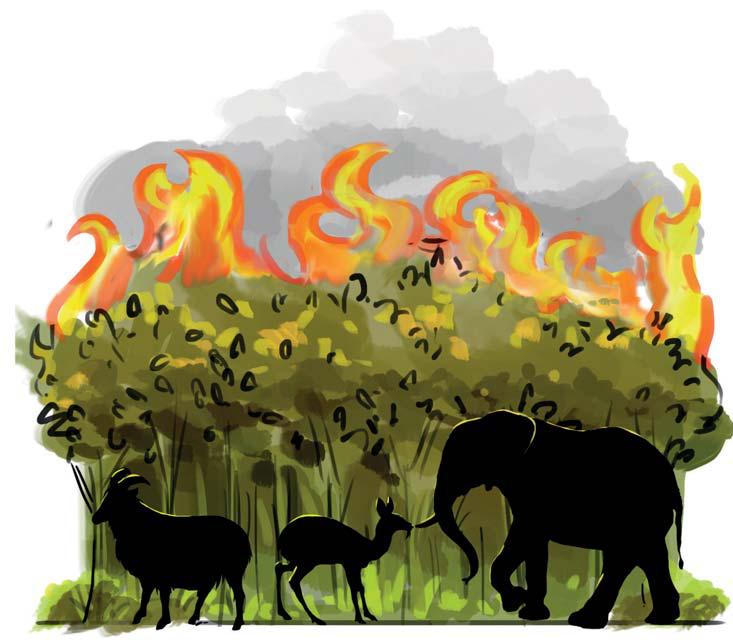Denemek ALTIN - Özgür
Fatal coincidence
Down To Earth
|April 16, 2023
Forest fire season in Uttarakhand coincides with flowering and breeding months of several vulnerable species, many of them native to Himalayas

FOREST FIRES are becoming more frequent and fierce in Uttarakhand. Such regular burnings can be catastrophic for the state as well as the rich biodiversity it harbours. Uttarakhand is home to at least 102 species of mammals, 70 reptiles, 19 amphibians, and 124 species of fish. The state also boasts of 600 species of birds. The International Union for Conservation of Nature (IUCN) classifies 55 of the bird species as "threatened", of which six are critically endangered and four are endangered. Several mammalian fauna found in the state are also classified as endangered. The list includes the Asian elephant, tiger, Alpine musk deer, Himalayan musk deer, leopard, snow leopard, blue sheep, Himalayan Thar, leopard cat, Himalayan black bear, sloth bear and pangolin. With 7,000 species of plants, Uttarakhand contributes 31 per cent of the country's floral diversity. As many as 119 flowering plants are endemic to the state. The impact of recurrent forest fires in Uttarakhand is therefore not limited to the direct loss of trees and wildlife, their displacement and subsequent colonisation of unwanted species.
Forest fires can meddle with the life cycle of species and push many of the threatened and endemic species closer to extinction.
For instance, by destroying the leaves and foliage, a forest fire can significantly reduce the photosynthetic activity of surviving trees and thereby affect their growth. It can also damage the seed bank, both above and below the ground, and wipe out the seedlings and saplings growing on the forest floor. Species that are sparsely distributed and have small or patchy populations suffer the worst impacts as they lose their habitat, territories, shelter and food. The loss of keystone organisms in forest ecosystems, such as invertebrates, pollinators, and decomposers, can significantly slow the recovery rate of the forest.
Bu hikaye Down To Earth dergisinin April 16, 2023 baskısından alınmıştır.
Binlerce özenle seçilmiş premium hikayeye ve 9.000'den fazla dergi ve gazeteye erişmek için Magzter GOLD'a abone olun.
Zaten abone misiniz? Oturum aç
Down To Earth'den DAHA FAZLA HİKAYE

Down To Earth
COP OF TALK
The UN's 30th climate summit, COP30 in Belém, was billed as the COP of truth and implementation.It was an opportunity for the world to move beyond diagnosis to delivery. Instead it revealed a system struggling to prove its relevance.
14 mins
December 01, 2025
Down To Earth
1,500 days, and an alarm for new climate
SEASONS ARE the compass that guide humans to survive and thrive as a society. What happens if seasons lose their distinct character and predictable rhythm? This is no longer a theoretical question. The Earth is entering a new climate regime, its atmosphere now saturated with greenhouse gases at levels without precedent in human history. And the earliest sign of this shift is the near-dissolution of familiar seasons; all merging and dissipating like the pupa inside the chrysalis, but, not to give birth to that mesmerising butterfly. This metamorphosis is manifest in the blizzard of weather events, extreme in severity and unseasonal by nature and geography.
2 mins
December 01, 2025

Down To Earth
Rights in transit
A recent dispute over transport and trade of kendu leaves in Odisha highlights differing interpretations of forest rights laws in the state
6 mins
December 01, 2025
Down To Earth
Roots of peace
Kerala's forest department plants fruit and fodder trees to ease human-wildlife tensions
2 mins
December 01, 2025

Down To Earth
Flattened frontiers
Efforts to reclaim degraded land from Chambal ravines expose both people and biodiversity to ecological risks from erosion and flooding
5 mins
December 01, 2025

Down To Earth
INDIA'S DRY RUN
India is poised to be a global hub of data centres—back-end facilities that house servers and hardware needed to run online activities.
21 mins
December 01, 2025

Down To Earth
Bangla generic drugs to the rescue
A buyer's club for generic cystic fibrosis drugs sourced from Bangladesh highlights the country's laudable pharma development
4 mins
December 01, 2025

Down To Earth
Direct approach
A new direct cash transfer scheme as well as decades of women-centric programmes yield an electoral windfall for the ruling alliance in Bihar
5 mins
December 01, 2025

Down To Earth
HIDDEN RESOURCE
Punjab's 1.4 million abandoned borewells offer a chance to mitigate flood damage and replenish depleting groundwater
4 mins
December 01, 2025
Down To Earth
Corporate bias
INDIA'S DRAFT Seeds Bill, 2025, introduced by the Centre in mid-November, proposes a few key changes.
1 min
December 01, 2025
Translate
Change font size
